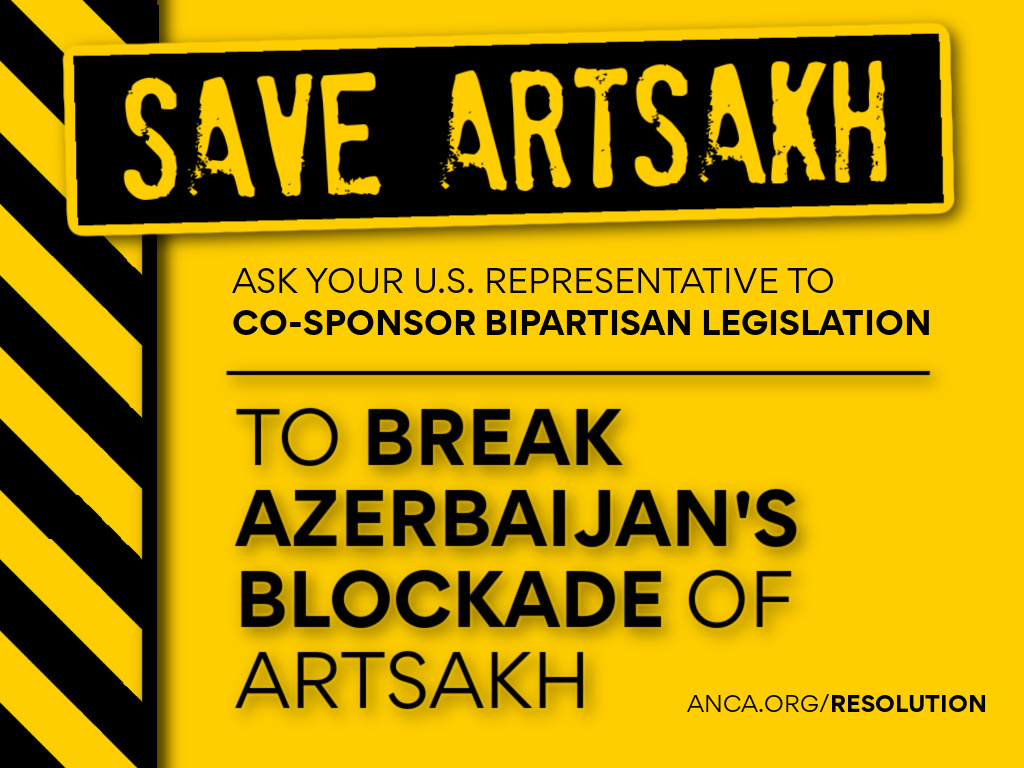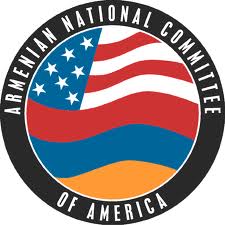 WASHINGTON, DC –Congressional Armenian Caucus co-chairs Frank Pallone (D-NJ), Gus Bilirakis (R-FL), Adam Schiff (D-CA) and David Valadao (R-CA) have joined with senior House Foreign Affairs Committee member Brad Sherman (D-CA) in rolling out new bi-partisan legislation – supported by the Armenian National Committee of America (ANCA) – aimed at breaking Azerbaijan’s brutal 46-day blockade of 120,000 indigenous Christian Armenians living in Artsakh (Nagorno Karabakh).
WASHINGTON, DC –Congressional Armenian Caucus co-chairs Frank Pallone (D-NJ), Gus Bilirakis (R-FL), Adam Schiff (D-CA) and David Valadao (R-CA) have joined with senior House Foreign Affairs Committee member Brad Sherman (D-CA) in rolling out new bi-partisan legislation – supported by the Armenian National Committee of America (ANCA) – aimed at breaking Azerbaijan’s brutal 46-day blockade of 120,000 indigenous Christian Armenians living in Artsakh (Nagorno Karabakh).
“Armenian and allied Americans welcome news of a targeted anti-blockade resolution, and are already hard at work alongside our local chapters, activists and coalition partners in Congressional districts across the country building bipartisan consensus around urgent enforcement of concrete costs on Azerbaijan for ethnic-cleansing Armenians,” said ANCA executive director Aram Hamparian. “Join our grassroots movement now, by taking action at anca.org/resolution.”
In a letter to Congressional colleagues encouraging them to cosponsor the anti-blockade resolution, Armenian Caucus founding co-chair Pallone explained, “The Aliyev regime is taking premeditated steps to remove the indigenous Armenian population from Artsakh and deprive them of the opportunity to live freely, democratically, and with dignity in the land of their ancestors – a clear sign of ethnic cleansing that we cannot ignore.” Rep. Pallone asserted, “the United States must act immediately and use every diplomatic tool available to reopen the corridor before this humanitarian crisis becomes catastrophic.”
In addition to forcefully condemning Azerbaijan’s actions, the soon-to-be-introduced resolution would place the US House of Representatives on record in favor of five practical remedies to the worsening humanitarian crisis in Artsakh caused by Azerbaijan’s blockade of food, medicine and other vital necessities:
1) US leadership in rallying the global community to petition international and multinational courts to investigate Azerbaijani war crimes.
2) US cooperation with international partners, including Artsakh authorities, in securing the deployment of international observers to the Lachin Corridor.
3) Presidential action to immediately suspend any US military or security assistance to Azerbaijan, and to enforce Section 907 of the FREEDOM Support Act
4) Presidential enforcement of statutory sanctions authority against Azerbaijani officials responsible for the blockade of Artsakh and other human rights violations
5) A robust program of sustained US humanitarian relief and longer-term development assistance to the Armenian victims of Azerbaijani aggression in Artsakh.and the Congressional Armenian Caucus leadership are spearheading a bi-partisan resolution to break the brutal blockade that oil-rich Azerbaijan put in place on December 11th against the 120,000 Christian Armenians living in their indigenous Artsakh homeland.
#####
TEXT OF PROPOSED US HOUSE RESOLUTION CONDEMNING AZERBAIJAN’S BLOCKADE OF ARTSAKH
RESOLUTION
Condemning Azerbaijan’s blockade of the Armenians of Nagorno-Karabakh (Artsakh) and ongoing human rights violations.
Whereas, Azerbaijani forces, in violation of international obligations to resolve disputes with Armenia and Artsakh peacefully, conducted a large-scale, unprovoked invasion of the Republic of Artsakh in October 2020.
Whereas, President Ilham Aliyev of Azerbaijan has used vitriolic rhetoric to call for the ethnic cleansing of indigenous Armenians in Nagorno-Karabakh and his regime has consistently violated important international humanitarian legal agreements during the 2020 war and up until the present date, including the Universal Declaration of Human Rights, the United Nations Charter, and the Geneva Convention.
Whereas, evidence of Azerbaijani violations of international humanitarian law during the 2020 war are well-documented by reputable non-governmental organizations such as Columbia University’s Institute for the Study of Human Rights, Amnesty International, Human Rights Watch, and the International Committee of the Red Cross.
Whereas, mass human rights violations committed by Azerbaijani forces in the 2020 war included rocket strikes on civilian infrastructure like medical facilities and schools, the decapitation of civilians, the use of white phosphorus munitions, the torture and extrajudicial killing of Armenian prisoners of war, the hiring of foreign mercenaries, and the targeting of historic monuments, works of art, and places of worship with great cultural and spiritual significance to Armenians.
Whereas, the November 9, 2020, ceasefire statement ending the 2020 war signed by Azerbaijan clearly states in Article 6 that, “The Lachin Corridor (5 km wide), which will provide a connection between Nagorno-Karabakh and Armenia while not passing through the territory of Shusha, shall remain under the control of the Russian Federation peacemaking forces… The Republic of Azerbaijan shall guarantee the security of persons, vehicles and cargo moving along the Lachin Corridor in both directions.”
Whereas, on December 12, 2022, Azerbaijan created a man-made humanitarian crisis by implementing an extended blockade of the Lachin Corridor under the guise of a civilian protest.
Whereas, the Lachin Corridor serves as a vital lifeline connecting the Republic of Artsakh to the Republic of Armenia and its blockade prevents food, critical medical supplies, and other essentials from reaching 120,000 people.
Whereas, Azerbaijan has taken dangerous, escalatory steps that have severely worsened the quality of life for the people living in Artsakh, including 30,000 children, 20,000 elderly individuals, and 9,000 people with disabilities, including the sabotage of civilian infrastructure such as a critical natural gas pipeline, power transmission lines, and fixed-line internet.
Whereas, the Russian peacekeeping forces deployed in the region have not lived up to their role as defined by the November 9, 2020 statement, doing little to disperse Azerbaijanis blocking the Lachin Corridor, deescalate the situation, or prevent other Azerbaijani aggressions against the Armenian population in Artsakh.
Whereas, the Department of State has warned the “Closure of the Lachin Corridor has severe humanitarian implications and sets back the peace process,” and publicly called “on the government of Azerbaijan to restore free movement through the corridor.”
Whereas, the Department of State reported that Secretary of State Antony J. Blinken spoke with Azerbaijan’s President Ilham Aliyev on January 23, 2023, “to urge an immediate reopening of the Lachin corridor to commercial traffic. He underscored that the risk of a humanitarian crisis in the Lachin corridor undermined prospects for peace between Armenia and Azerbaijan.”
Whereas, the United States serves as a Co-Chair of the Organization for Security and Co-operation in Europe Minsk Group, along with France and Russia, and is committed to sustainable, long-term peace in the region.
Whereas, the United States has not been able to undertake any direct humanitarian support or relief efforts to address the needs of Armenian victims in Artsakh since the deadly invasion by Azerbaijani forces in October 2020;
Resolved, That the House of Representatives—
(1) condemns Azerbaijan’s blockade of the Lachin Corridor to Nagorno Karabakh (Artsakh);
(2) encourages the United States Government and international community to petition the International Court of Justice, European Court of Human Rights, or other appropriate international tribunals to take appropriate steps to investigate any and all war crimes committed by the Azerbaijani forces;
(3) calls on the United States Government to work swiftly with our international partners, including authorities in Artsakh, regarding the deployment of international observers to the Lachin Corridor and Artsakh to explore opportunities for more effective and sustainable guarantees of security and peaceful development;
(4) calls on the President to immediately suspend any US new, current, or pending military or security assistance to Azerbaijan, and to fully enforce Section 907 of the FREEDOM Support Act;
(5) supports US sanctions under existing statutory authority against Azerbaijani officials responsible for the blockade of Nagorno-Karabakh and other well-documented human rights violations committed against Armenians in the region such as the targeting of civilian infrastructure and the destruction of historic, cultural, and places of worship of great significance to Armenians;
(6) supports a robust program of sustained US humanitarian and development assistance to the Armenian victims of Azerbaijani aggression in Nagorno-Karabakh, including the potential opening of an USAID office in Artsakh.
Author information
The post Anti-blockade resolution set for US House introduction appeared first on The Armenian Weekly.
